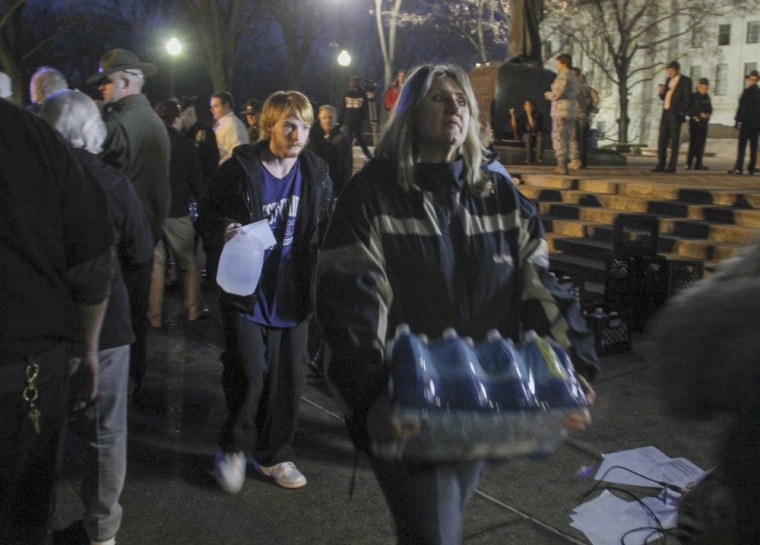
Nearly 800 people in West Virginia have reported symptoms after a chemical spill contaminated the water supply for nine counties, officials said Saturday.
By Saturday afternoon, the state's poison control center had logged 787 human exposure calls and 54 animal exposure calls since the massive leak sparked a tap-water ban for 300,000 residents, said the director Dr. Elizabeth Scharman.
Many of those were from people experiencing nausea, vomiting, diarrhea, headaches, skin irritation or rashes in “varying degrees of severity," Scharman said.
The center — which called in staff from vacation, recruited volunteers and put workers on 16-hour shifts — recommended that only a few callers go to the emergency room because most of the symptoms can be treated at home.
At least 90 people showed up at hospitals, though the vast majority of them didn't require emergency treatment, Scharman said. As many as five people have been admitted.
The West Virginia American Water Co. announced Thursday that its water supply had become contaminated, after a leak from a Freedom Industries storage tank about a mile upstream on the Elk River sent a strange licorice-like smell wafting through the streets in Charleston, the state capital.
West Virginia Gov. Earl Ray Tomblin declared a state of emergency in Boone, Cabell, Clay, Jackson, Kanawha, Lincoln, Logan, Putnam and Roane counties after the spill of up to 5,000 gallons into the Elk River.
"If you live in one of these areas, do not use tap water for drinking, cooking, cleaning, washing, or bathing. At this time, I do not know how long this will last," Tomblin said Friday.
"If you are low on bottled water, do not panic. Help is on the way."
On Friday, President Barack Obama declared a state of emergency in the nine counties authorizing the Department of Homeland Security and Federal Emergency Management Agency (FEMA) to provide disaster relief.
FEMA has delivery 1.4 million liters of water to the troubled areas, according to the aid agency.
Secretary of Homeland Security Jeh Johnson spoke with Tomblin on Friday to express concern and confirm response efforts were adequate, according to FEMA.
The West Virginia National Guard was enlisted to dispense bottled drinking water to emergency services agencies in the affected counties, as the feds opened a probe into the circumstances surrounding the spill.
The National Guard said tests administered on the water on Saturday showed the contamination level was decreasing but that the water was not yet safe to use, reported NBC affiliate WSAZ.
“I would expect that we are talking days” before the water is safe, said West Virginia American Water's president, Jeff McIntyre.
The U.S Chemical Safety Board announced Saturday that a team would arrive in West Virginia on Monday to investigate what led to “a leak of such magnitude.”
Senator Jay Rockefeller, D-W.Va., said he was pleased with the safety board’s quick response. “I remain committed to keeping those affected safe and secure, and making sure corrective actions are taken so this does not happen again," Rockefeller said.
On Saturday, dozens of distribution centers opened for people living in the water-banned areas, according to WSAZ. The leaked product is 4-methylcyclohexane methanol, which is used in the froth flotation process of coal washing and preparation.
The chemical compound is used to rinse coal. It’s a colorless oily liquid that smells like black licorice. Methylcyclohexane can be dangerous in high concentrations, but generally causes eye, skin and throat irritation, trouble breathing and dizziness or drowsiness if people are exposed, according to the Occupational Safety and Health Administration.
It can cause pneumonia if it’s breathed deep into the lungs and nausea if it’s swallowed. The effects of prolonged exposure aren’t clear.